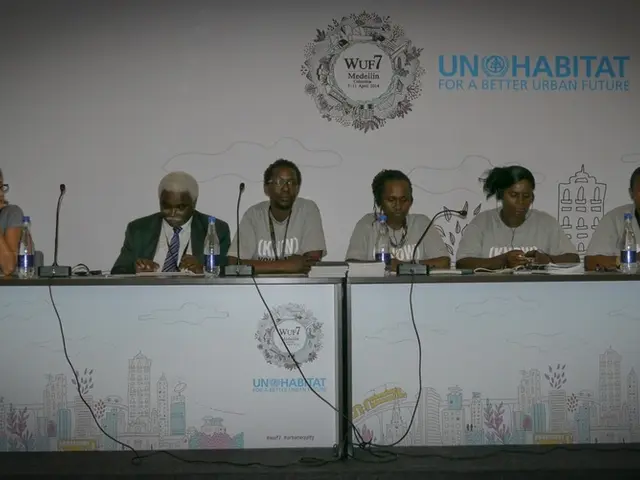Unraveling the RFK-led COVID-19 Vaccine Upheaval
Controversial evidence allegedly dubbed as 'junk science' reportedly submitted by Kennedy's HHS to safeguard vaccine amendments, claim experts.
In a rather bizarre twist, the Department of Health and Human Services (HHS) has stirred up a tempest by sending a questionable document to lawmakers, supporting Secretary Robert F. Kennedy Jr.'s contentious decision to change U.S. policy on COVID-19 vaccines. Kennedy's decision, announced on social media, involves no longer recommending vaccines for pregnant women or healthy children, bypassing the formal process for adjusting schedules for adults and kids [#1][#2].
Disputed Evidence and Mischaracterized Studies
The document, titled "FAQ on Covid Recommendations," has been criticized for distorting scientific evidence. It misrepresents legitimate studies, cites others that are under investigation for methodological issues and conflicts of interest, and dismisses numerous peer-reviewed studies that show a lower risk of complications after vaccination compared to contracting COVID-19 [#3][#4][#5].
Willful Medical Disinformation
Mark Turrentine, a professor of obstetrics and gynecology at Baylor College of Medicine, described the document as "willful medical disinformation" about the safety of COVID-19 vaccines for children and pregnant women [#4]. Medical experts warn that this disinformation could lead to a decline in vaccination rates, with detrimental consequences for public health.
Implications for Public Health Policy
The decision and the supporting document have significant implications for U.S. public health policy, particularly in terms of vaccine recommendations and the role of expert advisory committees. For instance, Kennedy recently removed all members of the Advisory Committee on Immunization Practices (ACIP), citing alleged conflicts of interest, and appointed new members who have expressed skepticism about vaccines [#2][#4].
Widespread Backlash from the Medical Community
The broader medical community has expressed grave concerns over these changes, particularly the inclusion of vaccine skeptics in the advisory committee. Former Surgeon General Jerome Adams criticized Kennedy's actions, stating they jeopardize public health and threaten public trust in health institutions.
Unraveling the Underlying Agenda
Critics argue that Kennedy's actions are part of a long-standing strategy to cherry-pick data or rely on dubious research to support his anti-vaccine agenda. Veteran pediatrician, Sean O'Leary, referred to Kennedy's tactics as his "playbook," which includes either twisting good science or using junk science to support his contested viewpoints [#4].
In conclusion, the controversy surrounding the HHS document and Kennedy's decision raises important questions about the integrity of scientific evidence used to inform public health policy and the potential consequences for public health and trust in medical institutions.
Sources:
[#1] "US Health and Human Services Secretary Robert F. Kennedy Jr. announced that the Covid-19 vaccine is no longer recommended for pregnant women and healthy children. - RFK" https://khn.org/news/article/us-health-and-human-services-secretary-robert-f-kennedy-jr-announced-that-the-covid-19-vaccine-is-no-longer-recommended-for-pregnant-women-and-healthy-children/
[#2] "HHS document supports Kennedy's decision to stop recommending COVID-19 vaccines for pregnant women, healthy children" https://khn.org/news/article/hhs-document-supports-kennedys-decision-to-stop-recommending-covid-19-vaccines-for-pregnant-women-healthy-children/
[#3] "One of the studies the HHS document cites is under investigation by its publisher regarding "potential issues with the research methodology and conclusions and author conflicts of interest," according to a link on the study's webpage." https://khn.org/news/article/hhs-document-supports-kennedys-decision-to-stop-recommending-covid-19-vaccines-for-pregnant-women-healthy-children/
[#4] "Health Secretary Robert F. Kennedy Jr. and Sen. Bill Cassidy. RFK Jr. made some promises on vaccines to get confirmed. Is he breaking them?" https://khn.org/news/article/health-secretary-robert-f-kennedy-jr-and-sen-bill-cassidy-rfk-jr-made-some-promises-on-vaccines-to-get-confirmed-is-he-breaking-them/
[#5] "Sean O'Leary, chair of the Committee on Infectious Diseases for the American Academy of Pediatrics and an assistant professor of pediatrics at the University of Colorado School of Medicine" https://khn.org/news/article/health-secretary-robert-f-kennedy-jr-and-sen-bill-cassidy-rfk-jr-made-some-promises-on-vaccines-to-get-confirmed-is-he-breaking-them/
- The HHS document, used to support Kennedy's decision on COVID-19 vaccines, has been criticized for misrepresenting scientific evidence about chronic diseases and mental health conditions.
- In the realm of health and wellness, a decline in vaccination rates due to medical misinformation could have detrimental consequences, especially for people with various medical-conditions.
- The controversy around the HHS document and Kennedy's decision raises questions about the use of questionable therapies and treatments in the field of clinical research.
- The decision to change U.S. policy on COVID-19 vaccines and the supporting document have implications for education and self-development, particularly in the realm of policy-and-legislation, personal-growth, and career-development.
- Critics of the HHS document argue that relying on studies with conflicts of interest and methodological issues could jeopardize the quality of general-news reporting and the integrity of crime-and-justice investigations.
- The ongoing debate highlights the importance of transparency in health education, and the need for continuous scientific research to address questions regarding cbd and its effects on health-and-wellness.
- In light of the recent vaccine controversy, there is a call for stronger measures to ensure the accuracy and accountability of medical-conditions information, particularly within politics and policy-making processes.








